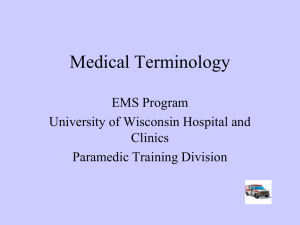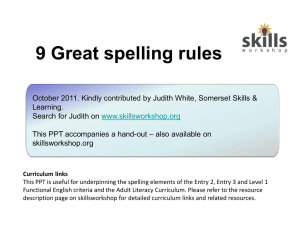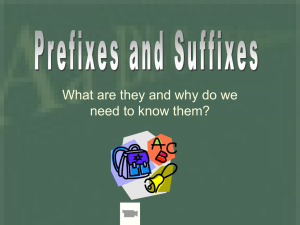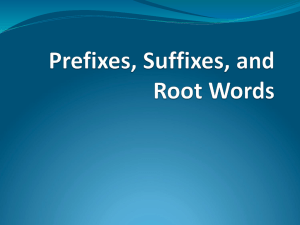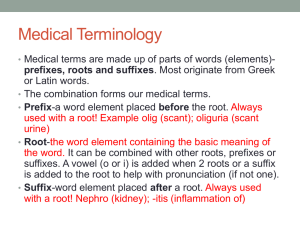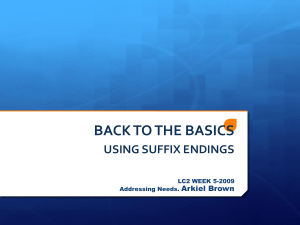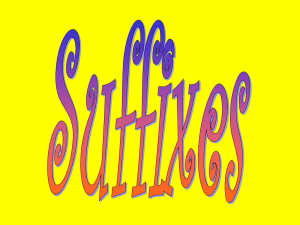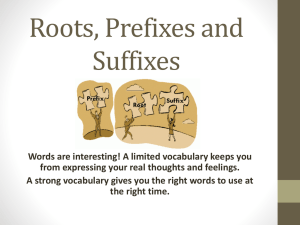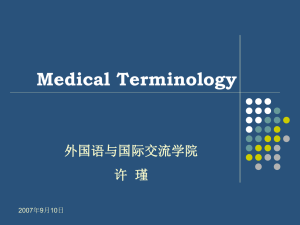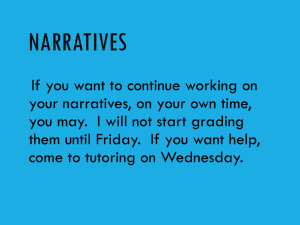abandoned abdominal original predict familiar carpet animal
advertisement
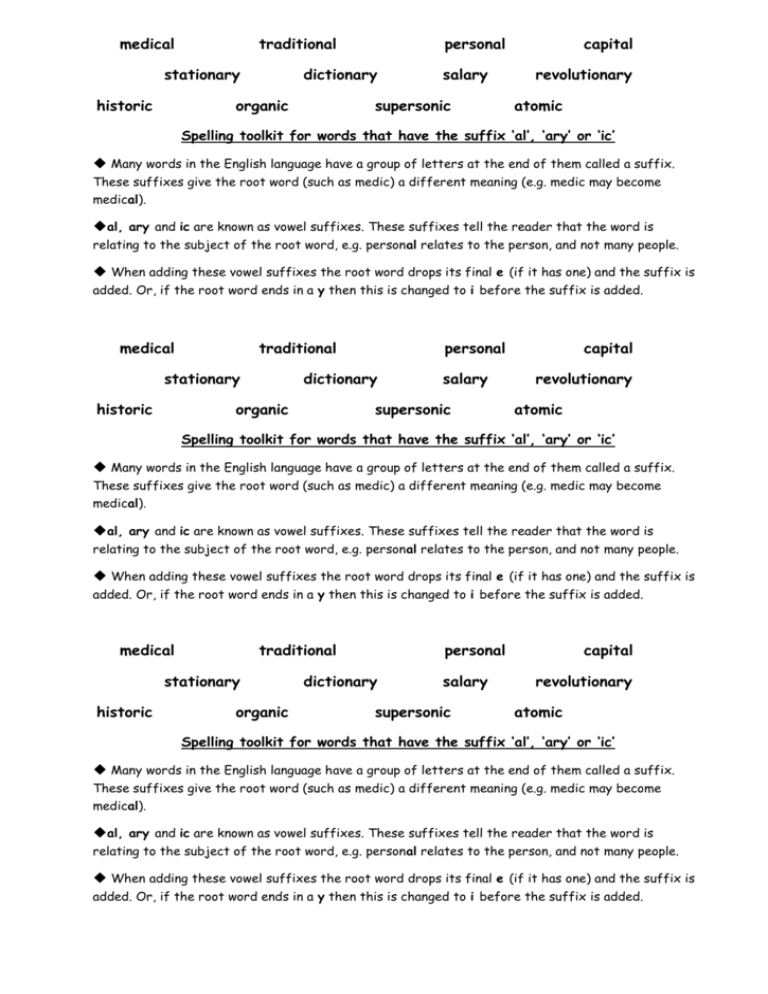
medical traditional stationary historic personal dictionary organic salary supersonic capital revolutionary atomic Spelling toolkit for words that have the suffix ‘al’, ‘ary’ or ‘ic’ ◆ Many words in the English language have a group of letters at the end of them called a suffix. These suffixes give the root word (such as medic) a different meaning (e.g. medic may become medical). ◆al, ary and ic are known as vowel suffixes. These suffixes tell the reader that the word is relating to the subject of the root word, e.g. personal relates to the person, and not many people. ◆ When adding these vowel suffixes the root word drops its final e (if it has one) and the suffix is added. Or, if the root word ends in a y then this is changed to i before the suffix is added. medical traditional stationary historic personal dictionary organic salary supersonic capital revolutionary atomic Spelling toolkit for words that have the suffix ‘al’, ‘ary’ or ‘ic’ ◆ Many words in the English language have a group of letters at the end of them called a suffix. These suffixes give the root word (such as medic) a different meaning (e.g. medic may become medical). ◆al, ary and ic are known as vowel suffixes. These suffixes tell the reader that the word is relating to the subject of the root word, e.g. personal relates to the person, and not many people. ◆ When adding these vowel suffixes the root word drops its final e (if it has one) and the suffix is added. Or, if the root word ends in a y then this is changed to i before the suffix is added. medical traditional stationary historic organic personal dictionary salary supersonic capital revolutionary atomic Spelling toolkit for words that have the suffix ‘al’, ‘ary’ or ‘ic’ ◆ Many words in the English language have a group of letters at the end of them called a suffix. These suffixes give the root word (such as medic) a different meaning (e.g. medic may become medical). ◆al, ary and ic are known as vowel suffixes. These suffixes tell the reader that the word is relating to the subject of the root word, e.g. personal relates to the person, and not many people. ◆ When adding these vowel suffixes the root word drops its final e (if it has one) and the suffix is added. Or, if the root word ends in a y then this is changed to i before the suffix is added. hopeful fearful wakeful thankful harmful scornful playful boastful faithful beautiful plentiful fanciful Spelling toolkit for words that contain the suffix ful ◆ ful is a suffix which means full of, but we drop the final l of full when affixing these type of suffixes/prefixes to words (e.g. all and till become al and til, such as always and until). ◆ When adding ful we change the y at the end of root words to i, e.g. beauty becomes beautiful. ◆ All other words just add ful (and not full). hopeful fearful wakeful thankful harmful scornful playful boastful faithful beautiful plentiful fanciful Spelling toolkit for words that contain the suffix ful ◆ ful is a suffix which means full of, but we drop the final l of full when affixing these type of suffixes/prefixes to words (e.g. all and till become al and til, such as always and until). ◆ When adding ful we change the y at the end of root words to i, e.g. beauty becomes beautiful. ◆ All other words just add ful (and not full). hopeful fearful wakeful thankful harmful scornful playful boastful faithful beautiful plentiful fanciful Spelling toolkit for words that contain the suffix ful ◆ ful is a suffix which means full of, but we drop the final l of full when affixing these type of suffixes/prefixes to words (e.g. all and till become al and til, such as always and until). ◆ When adding ful we change the y at the end of root words to i, e.g. beauty becomes beautiful. ◆ All other words just add ful (and not full). abandoned familiar boundary abdominal carpet business original animal predict description stationary category Spelling toolkit for polysyllabic words with unstressed vowels ◆ polysyllabic – more than one syllable. ◆ Unstressed vowels (also known as a schwa) – when a vowel sound is not stressed when read within a word. For example, the i in business is not stressed (it may sound like busyness if you did!) ◆ It’s tricky to learn how to spell these words. However, if you use related words (e.g. station for stationary) then you may only have a small part of a word to learn. You may also remember the spelling if you say the words how they may sound if they didn’t have the schwa (e.g. Wednesday – sounds like wed-nes-day). abandoned familiar boundary abdominal carpet business original animal predict description stationary category Spelling toolkit for polysyllabic words with unstressed vowels ◆ polysyllabic – more than one syllable. ◆ Unstressed vowels (also known as a schwa) – when a vowel sound is not stressed when read within a word. For example, the i in business is not stressed (it may sound like busyness if you did!) ◆ It’s tricky to learn how to spell these words. However, if you use related words (e.g. station for stationary) then you may only have a small part of a word to learn. You may also remember the spelling if you say the words how they may sound if they didn’t have the schwa (e.g. Wednesday – sounds like wed-nes-day). abandoned familiar boundary abdominal carpet business original animal predict description stationary category Spelling toolkit for polysyllabic words with unstressed vowels ◆ polysyllabic – more than one syllable. ◆ Unstressed vowels (also known as a schwa) – when a vowel sound is not stressed when read within a word. For example, the i in business is not stressed (it may sound like busyness if you did!) ◆ It’s tricky to learn how to spell these words. However, if you use related words (e.g. station for stationary) then you may only have a small part of a word to learn. You may also remember the spelling if you say the words how they may sound if they didn’t have the schwa (e.g. Wednesday – sounds like wed-nes-day).
